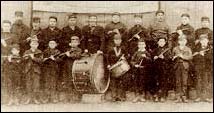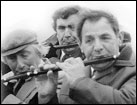Flute Bands
Flute Bands and Temperance
The herring fishing brought financial rewards and as a consequence, with it, problems of excessive drinking of alcohol. It was the women who first took the initiative in putting a stop to the ‘demon drink’ and ‘fighting folly’ which overtook the fishermen on their return to port. In 1850 the women of Inverallochy near Fraserburgh formed a Temperance Society which became affiliated to the League Of Abstinence Societies. In order to gain support for the movement Temperance walks were begun. These open displays of solidarity declaring abstinence angered the proprietors of the alehouses who ordered men to attack the marchers. Despite the threats and violence the temperance movement was spreading and eventually Parliament introduced limitations on the sale and distribution of spirits and beer.
![]() Will
your anchor hold? Cairnbulg and Inveralochy Flute Band, 1999
Will
your anchor hold? Cairnbulg and Inveralochy Flute Band, 1999
 In almost every fishing community evidence of religious worship is profound.
Presbyterian churches share streets with halls of worship belonging to
the Brethren, Salvation Army, Congregationalists and the Assemblies Of
God. Given the perilous nature of the fishing a strong belief in a higher
protective power can be as reassuring as a watertight hull.
In almost every fishing community evidence of religious worship is profound.
Presbyterian churches share streets with halls of worship belonging to
the Brethren, Salvation Army, Congregationalists and the Assemblies Of
God. Given the perilous nature of the fishing a strong belief in a higher
protective power can be as reassuring as a watertight hull.
Broadsea Temperance Flute Band, 1881
The communities along the coast have always proved destinations for the itinerant preachers. The religious revival of 1859 - 60 blew a wild wind of change through the villages as the revival movement swept across the Atlantic from America.
 The missionary of the north east who was called to the cause in this revival
and who took it upon himself to spread the gospel was James Turner, a
cooper from Peterhead. His preaching apparently touched more than eight
thousand souls to go forward to the penitent’s form or bench and
confess their sins and accept salvation.
The missionary of the north east who was called to the cause in this revival
and who took it upon himself to spread the gospel was James Turner, a
cooper from Peterhead. His preaching apparently touched more than eight
thousand souls to go forward to the penitent’s form or bench and
confess their sins and accept salvation.
Cairnbulg and Inveralochy Flute Band, December 1998
Another spiritual revival occurred in 1921 believed to have been started during the herring season in Yarmouth and Lowestoft. Again, it was a cooper, Jock Troup and his friend Wullie Bruce who carried the invitation for salvation to the villages.
The revivals brought a new song to the life of the fishers. Boats frequently left the harbours to the singing of the 23rd psalm. As the men shot their nets or lines, ‘Jesu Love Of My Soul’ or ‘Rock Of Ages’ filled the air, and if a successful trip was had, ‘0 God Of Bethel, By Whose Hand’ was sung with great gusto. Prayers were said as regular as the tides.

